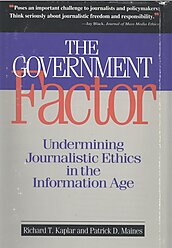Do journalistic ethics still have meaning in an age of sensationalism and tabloid TV? A skeptical public grows doubtful at a time when the media’s only principle seems to be “anything goes.” How has journalism reached this point, and what can be done to foster ethical conduct? The authors find answers in some surprising quarters. Government, they contend, has played a pervasive and largely overlooked role in journalists’ ethical decisionmaking. FCC rules governing program content, and a libel law system run amok, are only two ways government influences journalists’ behavior. This substitution of “government ethics” for private ethics creates minimum standards of conduct rather than challenging journalists to an ethical ideal. More subtly, government erects structural barriers to the development of the very technologies (like cable TV) that can offer journalists a more ethically-hospitable environment. In the information age, a marketplace approach to communications policy may do more to foster ethical principles of truth telling, independence, and humaneness.
The Government Factor: Undermining Journalistic Ethics in the Information Age
About the Book
About the Authors
Richard T. Kaplar is vice president of the Media Institute, a nonprofit research foundation in Washington, D.C. He is the author of several books and lives in Herndon, Virginia. Patrick D. Maines is president of the Media Institute. He has also written extensively on the communications policy issues and resides in Oakton, Virginia.
